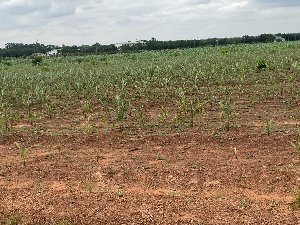Correspondence from Northern Region
Nearly two months of no rain in many parts of the Northern Region have plunged the area into an agricultural drought as many crops have started dying.
Farmers in the Tamale Metropolitan, Sagnarigu, Savelugu, and Yendi Municipalities, Tolon, Kumbungu, and Mion Districts are among the hardest hit areas, as they helplessly look on as their crops are gradually dying off.
Just a handful of farmers whose farms are closer to water sources have their crops surviving the devastating effects of the lack of precipitation in the region.
Many parts of the region last had heavy rainfalls in June and slight showers towards the end of June.
July, August, and September are usually the months farmers expect heavy rainfall patterns and therefore plan their farming season accordingly; however, the story has been different this year.
“I usually plan my season in June. I grow maize, which typically takes around 90 days to harvest. So, by July and early August, it’ll need a lot of water to grow well. If the rains come anytime after this period, then I’m in trouble,” Ishaq Abass, a maize farmer in the Tamale Metropolis, told GhanaWeb.
He said that at this point, he is only hoping for a miracle, as there are no signs of rain yet.
“You can see my maize plantation is drying up. This is over 20 acres of maize just drying up. I only hope for God’s intervention because I’ve just lost all hope.
Abass’ sad situation is not different from the many other farmers GhanaWeb spoke to.
At Ngarun in the Sagnarigu Municipality, another maize farmer, who gave his name only as Yushawu, said he had already lost his five acre maize farm to the drought.
He urged Ghanaians to store a lot of food because the coming year “may be difficult due to the effects of this drought.”
At Kpalsogu in the Tolon District, Ghanaweb spotted a large farm of maize, tomatoes, and pepper; however, none of the crops appeared to be surviving the drought.
The farmer, Yakubu Alhassan, could barely hold back his tears when we approached him for an interview.
“At least one of the crops should have survived. I just pray that the rain will come in the next few days so that I can at least get a bag or two from this. I’ve invested all my savings in this farm, and it’s turning out to be a huge loss,” he said.
The Ghana Meteorological Agency had earlier this year hinted that June–July would witness very low precipitation in the Northern region; however, many of the farmers say they were uninformed about it and thus followed their traditional calendar.
While farmers are counting their losses, a conversation has also been ongoing on what may have caused the nearly two-month-long spell of no rain.
While religiously inclined people are blaming it on the growing immortality and injustice in the Northern Region, hence a punishment from God on the area, proponents of climate change blame it on the devastating effects of climate change in the region due to its poor climate actions over the years.
On Thursday, August, the Muslim community in the region offered a special Islamic prayer, Salat-Al Istisqa (prayer for rain), to pray for the rains to come and call for God’s intercession.
However, proponents of climate change say that until conscious climate action is taken, the effects of climate change will only worsen in the northern parts of the country.
Business News of Saturday, 10 August 2024
Source: www.ghanaweb.com

















